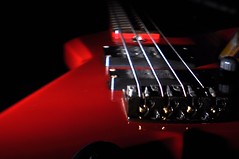How To Record Better Bass
The low-end of any recording always requires careful curation; bass notes contain the most energy, and eat up a lot of headroom within a mix. Whether you’re dealing with a live bass guitarist or a programmed synth bass, it’s difficult to keep everything sounding just right…
Bass Filtering
As a general rule, if a track isn’t specifically a bass track, then you should apply a high-pass filter to clear up any stray rumble. The cutoff for the filter will depend on where the information you actually want to retain on that track begins; but really you want your bass to occupy its very own space in the frequency spectrum.
If you don’t require sub-bass, then you can even high-pass the bass track itself – a cutoff at 40Hz is commonly used. For bass guitars, there are a lot of harmonics higher up the spectrum that add a great deal to the bass sound, so be careful about using low-pass filters… but for synth basses in particular, a low-pass filter can sometimes help clear up the mix.
Bass Compression
Because of their energy, it’s a good idea to keep a fairly consistent level across bass notes. This is why bass tracks are compressed on most mixes; a good bass guitarist might require only the lightest of compression, whereas deliberate overcompression is a common feature of many dance tracks. As always, compression settings are determined in relation to what you want to achieve.
The Art of Bass Guitar Performance
Ultimately though, what makes a great bass track is a great bass performance. You can add a bit of polish in the mix, and make it sit well as a record, but what really makes someone sit up and take notice is the music itself.
In the now-legendary Yep forum thread, the topic of ‘hit bass’ was raised. What makes that bass sound like a blockbuster hit?
Victor Wooten said outright that ‘notes don’t matter’. It’s the sound that’s the key, not the notes that you play. According to Yep:
…when I was trying to figure out what notes he was playing in a particularly cool fill, simply said, “Oh, it doesn’t matter– I just play whatever my finger is on.” I was floored. I still never really figured out that fill, but I watched him play it through a few times and he was right – he was playing it differently every time, playing notes that didn’t necessarily have anything to do with the key or anything, just flipping though this funky fill that SOUNDED THE SAME even though he was just hitting maybe 50% random open, muted, or half-closed strings… “it doesn’t really matter what you play, as long as you eventually land on the right notes, nobody’s gonna notice the stuff in-between. Just play with the drums.”
But of course, the notes do matter – you need to attain a certain level of melodic competence before you can move on to just flowing with the rhythm.
And, whether consciously or not, great bass players have a sense of how their play fits in with the mix, when they need to step it up, when to thin out. Here’s Yep once more:
All of them are also thinking like a producer, or an arranger, or a sound designer, almost as much as they are thinking like a musician. Maybe more so, even. They have internalized the critical role that the bass plays in the way that a track feels, and how the low-end communicates differently from melody or chords or harmony. They engineer the track with their fingers, every bit as much as they play a melodic line. Consciously or not, they are creating production value, not just music. Their bass lines breathe and pulse and bring the “get up and dance” in spades, regardless of whether they are playing simple, sustained root notes in a ballad or blippetty blurpetty funky fills and clusters in a funk track or pounding eigth-note pedal tones in a four-on-the-floor rock or dance song.
So, if you are ever lucky enough to record such a performer, it seems the best thing to do is just hit ‘record’ and enjoy the music…

